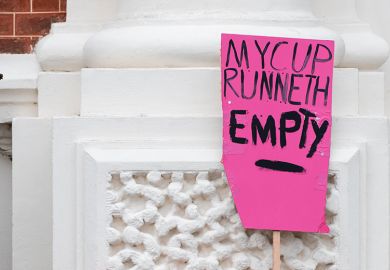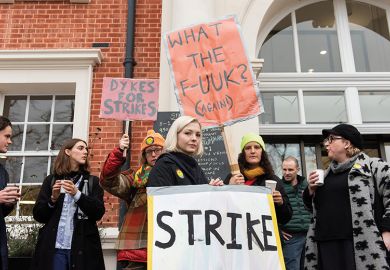University employers have offered to set sector-wide “expectations” around the use of casual contracts, gender and ethnicity pay gaps and workloads amid a dispute over pay and working conditions.
The Universities and Colleges Employers Association said the proposals – which include expectations that UK universities use indefinite contracts as the general form of employment and demonstrate transparency in their efforts to end gender and ethnicity pay gap – show that it is “going a great deal further than ever before as a national employer body”.
Jo Grady, general secretary of the University and College Union, said the offer was a big step forward although “still some distance from fulfilling all the demands we have lodged with employers”.
The proposals, sent to the UCU on 27 January, do not include any movement on the 1.8 per cent pay offer, tabled before the industrial action in 2019.
Other elements of the offer include working with trade unions to review action plans on pay gaps, to make them publicly available and to commit to making interventions to address any issues found.
Ucea said that where staff had to be employed on fixed-term or casual contracts, universities would be expected to give them access to staff development, training, appraisal and careers advice, in the same way as those on indefinite contracts. Institutions should also develop procedures to ensure that individuals are given achievable work demands, the proposals said.
Dr Grady said that while a prescriptive set of actions and more transparency on the issues was welcome, employers had “refused to put forward a clear set of mechanisms for policing and enforcing the expectations which they are signing up to".
“The plans laid out in Ucea’s offer will not do much to alleviate the stress and burnout which we know are caused by the unfair, often inhumane, expectations employers place on us,” she said. However, she added, “we are on the right track to achieving lasting change in our sector.”
Ucea said universities were “autonomous employers and distinctive organisations” with the right to set their own contracts and working conditions.
Helen Fairfoul, the association’s chief executive, said she had “never seen Ucea given the scope we have taken here to present such extensive proposals on behalf of our members”.
“We really feel now that all trade union members deserve to be consulted over what is on the table,” she added.
The UCU’s higher education committee will meet on 30 January to discuss whether to accept or reject the offer.
If it is rejected, union members are likely to go on strike again this year, after members at 60 institutions walked out for eight days at the end of 2019. On 28 January, ballots closed at a further 36 institutions on whether they would join the action this time.
The industrial action is also related to the pensions row over changes to the Universities Superannuation Scheme. Although talks are under way, that issue has yet to be resolved either.
Register to continue
Why register?
- Registration is free and only takes a moment
- Once registered, you can read 3 articles a month
- Sign up for our newsletter
Subscribe
Or subscribe for unlimited access to:
- Unlimited access to news, views, insights & reviews
- Digital editions
- Digital access to THE’s university and college rankings analysis
Already registered or a current subscriber?








